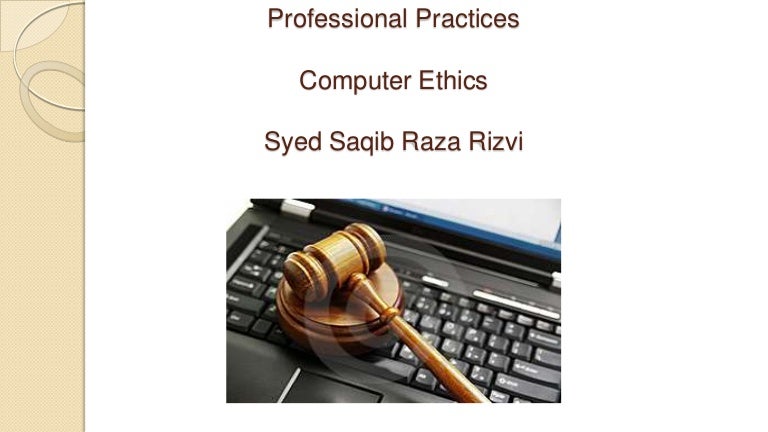Computer Ethics 3rd Edition By Deborah G Johnson Pdf Files
- Computer Ethics 3rd Edition By Deborah G Johnson Pdf Files Online
- Computer Ethics 3rd Edition By Deborah G Johnson Pdf Files Pdf
Computer Ethics Helicopter View. Amory Lovins, Published as a guest essay, in G. Tyler Miller, 'Environmental Science', 3rd ed. Belmont, CA, 1991. 3 / 51 Values Embedded in Design. Source: 'Computer Ethics', Deborah G.Johnson, 1985 4th Edition, Pearson International Edition, Prentice Hall, January 2009 8 / 51. Source: 'Iran stocks up. Buy a cheap copy of Computer Ethics (3rd Edition) book by Deborah G. Written in clear, accessible prose, the Fourth edition of Computer Ethics brings together philosophy, law, and technology.
Contents
Preface vi
Acknowledgments viii
About the Authors viii
Chapter 1 Introduction to Sociotechnical Computer Ethics
Chapter Outline 1
Scenarios 2
1.1 A Virtual Rape 2 • 1.2 Surprises About Social Networking 3 • 1.3 RFID and Caring for the Elderly 4
Introduction: Why Computer Ethics? 5
The Standard Account 7
New Possibilities, a Vacuum of Policies, Conceptual Muddles 7 • An Update to the Standard Account 10
The Sociotechnical Systems Perspective 13
Reject Technological Determinism/Think Coshaping 13 • Reject Technology as Material Objects/Think Sociotechnical Systems 15 • Reject Technology as Neutral/Think Technology Infused with Value 17
Sociotechnical Computer Ethics 18
Micro- and Macro-Level Analysis 21
Return to the “Why Computer Ethics?” Question 21
Conclusion 22 • Study Questions 23
Chapter 2 Ethics and Information Technology 24
Chapter Outline 24
Introduction: “Doing” Ethics 25
Descriptive/Normative 26 • The Dialectic Method 28 • Ethics is Relative” 32
Ethical Theories and Concepts 35
Utilitarianism 35 • Intrinsic and Instrumental Value 36 • Acts versus Rules 38

Critique of Utilitarianism 39 • Case Illustration 41 • Deontological Theory 42 • Case Illustration 44 • Rights 46 • Rights and Social Contract Theory 47 • Virtue Ethics 48 • Analogical Reasoning in Computer Ethics 49
Conclusion 51 • Study Questions 51
Chapter 3 Ethics in IT-Configured Societies 53
Chapter Outline 53
Scenarios 54
3.1 Google in China: “Don’t Be Evil” 54 • 3.2 Turing Doesn’t Need to Know 553.3 Turnitin Dot Com 55
Introduction: IT-Configured Societies 55
Technology as the Instrumentation of Human Action 56
Cyborgs, Robots, and Humans 58
Three Features of IT-Configured Activities 60
Global, Many-to-Many Scope 61 Distinctive Identity Conditions 62 Reproducibility 65
IT-Configured Domains of Life 66
Virtuality, Avatars, and Role-Playing Games 66 Friendship and Social Networking 68 Education and Plagiarism Detection 70
Democracy and the Internet 72

What Is Democracy? 73 The Arguments 74 • Is the Internet a Democratic Technology? 76
Conclusion 79Study Questions 79
Chapter 4 Information Flow, Privacy, and Surveillance 81
Chapter Outline 81
Scenarios 82
4.1 Email Privacy and Advertising 82 • 4.2 Workplace Spying: The Lidl Case 82• 4.3 Data Mining and e-Business 83
Introduction: Information Flow With and Without Information Technology 84
Why Care About Privacy? 86
No Need to Worry” 87 • The Importance of Privacy 90 • Privacy as an Individual Good 90 • Privacy as Contextual Integrity 93 Privacy as a Social Good Essential for Democracy 95 Autonomy, Democracy, and the Panoptic Gaze 96 Data Mining, Social Sorting, and Discrimination 98 Crude Categories 100 •Summary of the Arguments for Privacy and Against Surveillance 101
Resident evil afterlife cast. Is Privacy Over? Strategies for Shaping Personal Information Flow 101
Fair Information Practices 102 Transparency 104 Opt-In versus Opt-Out 104 •Design and Computer Professionals 105 •Personal Steps for All IT Users 106 •A Note on Privacy and Globalization 107
Conclusion 107Study Questions 108
Chapter 5 Digital Intellectual Property 109
Chapter Outline 109
Scenarios 110
5.1 Obtaining Pirated Software Abroad 110 • 5.2 Free Software that Follows Proprietary Software 110 • 5.3 Using Public Domain Software in Proprietary Software 111
Introduction: The Complexities of Digital Property 111
Definitions 112 Setting the Stage 113
Protecting Property Rights in Software 114
Copyright 114 Trade Secrecy 118 Patent Protection 119
Free and Open Source Software 122
The Philosophical Basis of Property 124
Natural Rights Arguments 124 Critique of the Natural Rights Argument 125• A Natural Rights Argument Against Software Ownership 127
PS Versus FOSS 128
Is it Wrong to Copy Proprietary Software? 129
Breaking Rules, No Rules, and New Rules 133
Conclusion 135 • Study Questions 136
Chapter 6 Digital Order 137
Chapter Outline 137
Scenarios 137
6.1 Bot Roast 137 • 6.2Wiki Warfare 138 • 6.3Yahoo and Nazi Memorabilia 139
Introduction: Law and Order on the Internet 140
Sociotechnical Order 142
Online Crime 143
Hackers and the Hacker Ethic 145
Sociotechnical Security 150
Who Is to Blame in Security Breaches? 152 Trade-Offs in Security 153
Wikipedia: A New Order of Knowledge Production 154
Freedom of Expression and Censorship 156
John Stuart Mill and Freedom of Expression 157
Conclusion 160 •Study Questions 161
Chapter 7 Professional Ethics in Computing 162
Chapter Outline 162
Scenarios 163
7.1 Software Safety 163 • 7.2 Security in a Custom Database 164• 7.3 Conflict of Interest 164
Introduction: Why Professional Ethics? 165
Therac-25 and Malfunction 54 165
The Paradigm of Professions 167
Characteristics of Professions 168
Sorting Out Computing and its Status as a Profession 171
Mastery of Knowledge 171 Formal Organization 172 Autonomy 173 Codes of Ethics 174 The Culture of Computing 175
Software Engineering 176
Professional Relationships 178
Employer—Employee 178 Client—Professional 180 Other Stakeholders—Professional 182 Professional—Professional 183 Conflicting Responsibilities 184
A Legal Perspective on Professionalism in Computing 185
Licensing 185 Selling Software 186 Selling—Buying and the Categorical Imperative 187 Torts 188 Negligence 188
A Final Look at the State of the Profession 190
Guns-for-Hire or Professionals 190 Efficacy, Public Trust, and the Social Contract 191
Computer Ethics 3rd Edition By Deborah G Johnson Pdf Files Online
Conclusion 192 • Study Questions 193
Websites 195
Computer Ethics 3rd Edition By Deborah G Johnson Pdf Files Pdf
References 196
Index 198